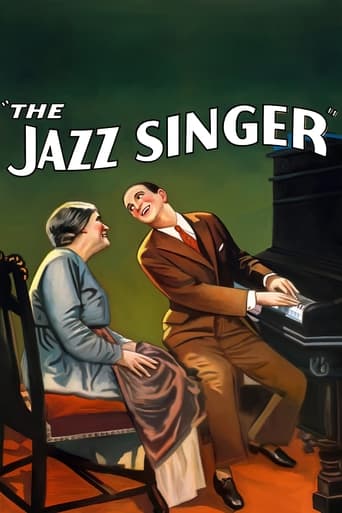Matreats :P
Made in 1927 and starring Al Jolson, The Jazz Singer was a film that impacted Hollywood forever. It was the first film with sound that was a commercial success, and led to silent films being completely scrapped in favor of sound. Within three years of The Jazz Singer's release, silent movies were no longer produced.The plot for the movie is very simple and easy to understand: A father who has been a Cantor, or a singer in a Jewish synagogue, wants his son, Jackie Rabinowitz, to follow in his footstep and become one as well. For five generations the prestigious Cantor position has been passed on from father to son, and the father argues that Jackie must become a Cantor to follow the tradition. Jackie has other plans however, and wants to follow his own dream of becoming a Jazz singer. His father highly disagrees with his decision, and Jackie ends up leaving the house to pursue his dream.The sound quality was good for a movie made in the 1920's, and set the mood well for the high tension and the calmer scenes. However, that there wasn't much of a pause in the music, and they could've had breaks and decrescendos so it wasn't so much of a flat sound. The changes from silent to sound, then back again after a song number or performance was a bit sudden, but they were trying out sound in movies for the first time. The actual songs that were sung had seemingly random spoken parts that staggered and threw off the beat for me, and left some awkward pauses. They were pretty exaggerated; a bit too much for my liking. The music style was different then, and I realize that, but the song choice still isn't my favorite.Almost immediately, it was obvious that the film wasn't as good of quality as some of the older movies like the 1927 version of The Phantom of the Opera. The lighting in the background when the beginning credits came up made some of the text impossible to read. It was noticeable throughout the movie, that any white or light colors were too bright, and it made it look like they were glowing. It was distracting from the surroundings, and in some scenes, you could hardly tell who a person or a thing was. I did appreciate the use of flashbacks though, which brought more emotion and meaning to Jackie's thoughts. The memory fading in and out helped us understand what he was thinking without him having to say it or spell it out for the viewer. Flashbacks are something we still use today in modern movies to great effect.This film was good, but it wasn't the best. The story line in itself is cliché, and they shouldn't have resolved the ending like they did. It felt like it disregarded the climax and the main conflict. To close, I would rate The Jazz Singer at 5 stars, and although it is a very influential film in movie history, I probably wouldn't watch it again.
cameron-59-297793
The "roaring twenties" was a huge time for the United States! There were many new things going on! One huge thing was that people would go to movie theaters to watch old silent films! This was also when the prohibition happened so people were having parties and the crime family thrived with illegal usage and selling of alcohol. The twenties was also the birth of a whole new genre of music: Jazz! Starting in Harlem, jazz quickly grew everywhere in the US. But something in 1927 happened that no one thought would happen, The Jazz Singer came out! This movie was the very first talkie! Most major movie companies thought that the world was not ready for a talkie was it was deemed to be a complete and utter failure. Something surprised them, however, it was a huge success, gaining money and putting a lot of silent actors into a jobless environment. This movie was a stepping stone to cinema history!
vincentlynch-moonoi
All my life I promised myself that I'd sit down some evening and watch "The Jazz Singer". Well, just a couple of days after my 65th birthday, I finally did. I love old movies...but not quite this old. My interest begins about 5 years after this production...somewhere around 1932 (give or take).Without dialog (and this film only has spoken word in some parts...mostly Jolson's songs), films go very slowly to me...and this film is no exception. Of course, I didn't watch this film for entertainment. I watched for its history, and this film is just as historical as about anything you'll find in a museum -- the first real talking motion picture -- a true revolution.Nevertheless, the plot here is not too bad if you can stand all those silent dialog boxes. I'd like to criticize Jolson for sometimes over-acting, but is that fair way back during the transition from silent to talking pictures? Certainly Warner Oland (later Charlie Chan, here the father and cantor) is stiff as a board...even before he died in the film. Eugenie Besserer as the mother was quite good. Otto Lederer has an entertaining role as a family friend. And of course, every one and every thing is VERY Jewish.This film is primitive enough (though the print shown on TCM is very good considering the age) that you may not find it palatable. In that case, soak in the history as you watch the man who considered himself to be the world's greatest entertainer. This film is history.

